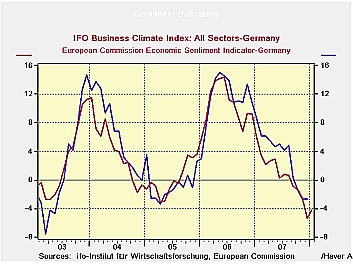 Global| Jan 24 2008
Global| Jan 24 2008Germany’s IFO Index Bounces on Improved Expectations
Summary
Bounce raises the question of EMU-US de-coupling. Apparently Germans agree… They agree with the ECB that weakness does not threaten Germany or Europe and they see better times ahead as the IFO expectations index that looks six months [...]

Bounce raises the question of EMU-US de-coupling.
Apparently Germans agree… They agree with the ECB that
weakness does not threaten Germany or Europe and they see better times
ahead as the IFO expectations index that looks six months into the
future rose enough to kick the climate index higher. No wonder Axel
Weber, Bundesbank president, was saying that markets do not understand
the ECB and are too driven by short-term horizons. Weber, in comments
today, hinted that the next ECB move could be to tighten, not to ease
as markets had expected just yesterday.
These events raise the question of whether markets have
de-coupled or whether either Europe’s or the US central bankers are
just plain wrong about the outlook. Can Europe be so strong that it may
need to tighten if the US is as weak as all the fiscal and monetary
stimulus in train seem to expect? Or is Germany and the ECB simply
wrong in their outlook? Or is the Fed and Congress wrong and just too
wrapped up in the needs of US short-term presidential election year
politics?
We can’t tell here and now, but time will tell.
The respondents to the IFO survey did see somewhat weaker
current conditions, but not much weaker. At a value of 107.9 the
current index is still in the top quartile of its range. It slipped by
just 0.2 points in January, less than in December. It is still well
above its average value of 95.0. It is lower year/year by 4.2%, less
than the 6.2% drop registered on that basis in December.
Business expectations improved by 0.8% in Germany. This
propelled the overall climate index up to 103.4 from 103.0 in December.
Expectations are still lower by 4.1% Yr/Yr less than the 4.3% drop
registered in December. But the IFO survey is hardly a report ringing
warning bells in the ears of the ECB.
The overall EU index for Germany had already slowed its rate
of descent in December. Now the IFO actually has improved. We seem to
have a decoupling in progress if the actions of the ECB and the Fed are
each correct. The question is: are they?
| IFO Survey: Germany | ||||||||
|---|---|---|---|---|---|---|---|---|
| Jan-08 | Dec-07 | Nov-07 | Oct-07 | Sep-07 | Aug-07 | Jul-07 | Jun-07 | |
| Biz Climate | -4.2% | -5.3% | -2.5% | -1.4% | -1.0% | 0.7% | 0.8% | 0.3% |
| Current Situation | -4.3% | -6.2% | -3.2% | -2.1% | -1.3% | 2.5% | 2.4% | 1.6% |
| Biz Expectations | -4.1% | -4.3% | -2.0% | -0.8% | -0.4% | -1.1% | -0.9% | -1.3% |
Robert Brusca
AuthorMore in Author Profile »Robert A. Brusca is Chief Economist of Fact and Opinion Economics, a consulting firm he founded in Manhattan. He has been an economist on Wall Street for over 25 years. He has visited central banking and large institutional clients in over 30 countries in his career as an economist. Mr. Brusca was a Divisional Research Chief at the Federal Reserve Bank of NY (Chief of the International Financial markets Division), a Fed Watcher at Irving Trust and Chief Economist at Nikko Securities International. He is widely quoted and appears in various media. Mr. Brusca holds an MA and Ph.D. in economics from Michigan State University and a BA in Economics from the University of Michigan. His research pursues his strong interests in non aligned policy economics as well as international economics. FAO Economics’ research targets investors to assist them in making better investment decisions in stocks, bonds and in a variety of international assets. The company does not manage money and has no conflicts in giving economic advice.






